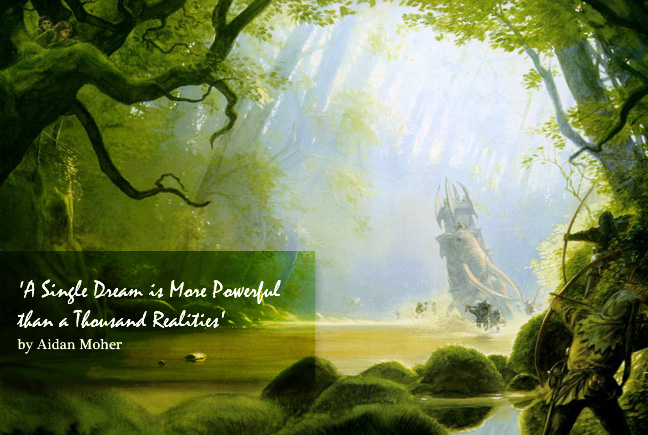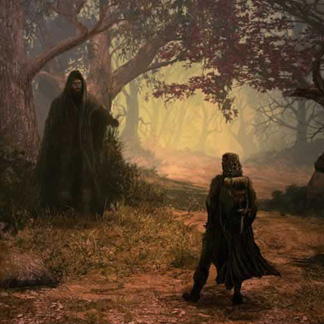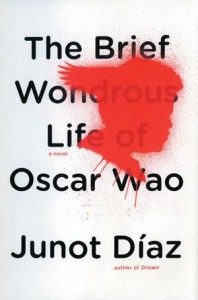
Art by John Howe
One evening, I had the chance to sit down with Steven Erikson and several other people over a glass of wine and dinner. It was a wonderful evening, full of laughs, camaraderie and discussion. Despite what you might think, me being a book blogger and Steve being a popular author, only a small portion of the evening was spent discussing fiction, books or writing. However, one short conversation, not with Mr. Erikson but with one of his friends, led me to think a lot about why I read, and when I read.
The conversation began with a question, “Do you read before bed?”
Some of us answered no, others, including myself, said, “Yes, I can’t fall asleep otherwise.” Those who answered “no,” had some interesting reasons, though they escape me now, but one of the other diners, a woman whose name I’m sorry to say I can’t remember, began talking about why she reads before bed. She made an observation that has stuck with me since. You see, she reads before bed because it allows her to put aside the events of her day, the events that might be coming the next day, and immerse herself in the emotions, problems and triumphs of the people living in the fiction she holds in her hands. Instead of falling asleep thinking about what needs doing tomorrow, or how her exam went poorly, she falls asleep wrapped in thoughts of these characters, wandering through these other landscapes.
 In November 2011, Matt Killingsworth, a PhD student at Harvard, gave a TED Talk called “Want to be happier? Stay in the moment”. He discussed the idea that humans are generally happiest when they are engaging directly with whatever it is that they’re doing at the moment, and that it’s within those moments where the mind is left to wander that worry and other negative feelings begin to take root. As you can likely attest to, there are few times when the mind is more likely to wander than during those quiet moments before bed, while you’re brushing your teeth, showering, or just snuggling into your blankets. Most forms of entertainment, like videogames, television or music, are good at allowing your mind a distraction, a new point of focus, but reading engages in a way that those other mediums don’t, asking the mind work as it wraps itself around the narrative and world half-created for me by the author, filling in that other half with the reader’s own interpretations and spirits. Fantasy, of the Epic or Secondary World kind in particular, is good for this, and that is one of the reasons that it’s my genre of choice.
In November 2011, Matt Killingsworth, a PhD student at Harvard, gave a TED Talk called “Want to be happier? Stay in the moment”. He discussed the idea that humans are generally happiest when they are engaging directly with whatever it is that they’re doing at the moment, and that it’s within those moments where the mind is left to wander that worry and other negative feelings begin to take root. As you can likely attest to, there are few times when the mind is more likely to wander than during those quiet moments before bed, while you’re brushing your teeth, showering, or just snuggling into your blankets. Most forms of entertainment, like videogames, television or music, are good at allowing your mind a distraction, a new point of focus, but reading engages in a way that those other mediums don’t, asking the mind work as it wraps itself around the narrative and world half-created for me by the author, filling in that other half with the reader’s own interpretations and spirits. Fantasy, of the Epic or Secondary World kind in particular, is good for this, and that is one of the reasons that it’s my genre of choice.
Terry Brooks, an author often attributed with revitalizing the Fantasy genre after it faltered somewhat in the post-Tolkien doldrums, spoke recently, also at a TED conference, this one a TEDx conference in Seattle, Washington in November, 2012, about the symbiotic relationship between author and reader:
If you think for just a minute about the way that books work, books are an equation. On the one side of the equation we have the writer. The writer, through use of imagination, and through the use of writer’s skills and, hopefully, some experience and practice, creates a story by putting words on a page, and it’s like a million pieces of a giant puzzle. If the words are fit together in the right way, it creates a picture, it creates images, it fills out the plots, it tells about the characters, it describes the setting, all of the elements that go into making up a book. And, at some point, the author’s done everything the author can do, and the book goes out to the reader. The reader, as the other half of the equation, brings to the experience, his or her own imagination, which interprets the words on the page and images in an entirely different way, because books are personal to every single person who reads them, and so, for each person it’s a different experience.
Brooks brings to light that bond between the reader and the author’s creation, and emphasizes the co-authorship between the two halves of the equation of the story being woven as the reader turns each page. It’s an amazing ability that books have, to take what is essentially a linear narrative and create something unique out of it for every time it is experienced by someone new. Few artistic mediums challenge the consumer to contribute nearly as much of themselves to the actualization of the work as the author herself.
 While it’s unfair to rag on popular literature for often featuring easily recognized contemporary settings (give or take a few decades), there’s a draw to Fantasy that I’ve never been able to ignore, and I think this co-authorship sits at the centre of things. See, if you buy into the idea of Fantasy as escapist literature, especially the Fantasy filled with invented worlds, languages, races and magics, there are many reasons why it’s a perfect genre to fall into when you’re trying to get your mind off of the real world. Many of the issues, emotions and challenges faced by the protagonists in Fantasy novels are familiar — we all struggle with self-doubts, or physical challenges to reach our goals — but the frame is different from contemporary literature. One of the most critically lauded novels of this new century is The Wonderful Life of Oscar Wao by Junot Diaz. It deals with a fellow named, appropriately, Oscar Wao, who often uses Fantasy for its escapist qualities as he carves his path through life. As an avid fan of the genre, I was hoping that Diaz’ book would win its way into my heart, but even as I flipped the final pages, I found that I had never warmed to it. It’s not that it wasn’t well written, or witty, nuanced or emotionally resonant, it is all those things, but Oscar Wao’s struggles, when he crawled out of his novels, were all to recognizable to me, the world around him was all too recognizable, because we live in a closely mirrored reality. I was never able to sink into the novel, because things would happen, conversations would be had, or locations would be visited that would remind me of the things going on in my own life, good and bad. My mind would wander. Instead of living in the world inside the book, I found my contemplating the videogame I was currently playing (another favourite past time of Wao’s), a kitchen that needed cleaning, or a lovely wife who deserved more of my attention. Oscar Wao never made promises of adventure as I drifted off into dreams.
While it’s unfair to rag on popular literature for often featuring easily recognized contemporary settings (give or take a few decades), there’s a draw to Fantasy that I’ve never been able to ignore, and I think this co-authorship sits at the centre of things. See, if you buy into the idea of Fantasy as escapist literature, especially the Fantasy filled with invented worlds, languages, races and magics, there are many reasons why it’s a perfect genre to fall into when you’re trying to get your mind off of the real world. Many of the issues, emotions and challenges faced by the protagonists in Fantasy novels are familiar — we all struggle with self-doubts, or physical challenges to reach our goals — but the frame is different from contemporary literature. One of the most critically lauded novels of this new century is The Wonderful Life of Oscar Wao by Junot Diaz. It deals with a fellow named, appropriately, Oscar Wao, who often uses Fantasy for its escapist qualities as he carves his path through life. As an avid fan of the genre, I was hoping that Diaz’ book would win its way into my heart, but even as I flipped the final pages, I found that I had never warmed to it. It’s not that it wasn’t well written, or witty, nuanced or emotionally resonant, it is all those things, but Oscar Wao’s struggles, when he crawled out of his novels, were all to recognizable to me, the world around him was all too recognizable, because we live in a closely mirrored reality. I was never able to sink into the novel, because things would happen, conversations would be had, or locations would be visited that would remind me of the things going on in my own life, good and bad. My mind would wander. Instead of living in the world inside the book, I found my contemplating the videogame I was currently playing (another favourite past time of Wao’s), a kitchen that needed cleaning, or a lovely wife who deserved more of my attention. Oscar Wao never made promises of adventure as I drifted off into dreams.
A single dream is more powerful than a thousand realities.
Fantasy, more than almost any other genre, has an unerring ability to help readers understand that the world is never exactly what they think it is. Fantasy has constantly helped me rediscover the wonder in the world and caused a deep-seated desire to approach the world with open eyes, open arms and an open mind. If Fantasy literature is anything, it is diverse – opening the readers eyes to the possibility that anything is possible. If there is anything that I fear we are losing in today’s culture, it is a sense of discovery and wonder, a sense of imagination and a willingness to find those things that are good and magical in our world. Many books explore these problems, but Fantasy provides answers.
To quote the oft-quoted, “A single dream is more powerful than a thousand realities.” I think Tolkien was onto something here.
So, I ask myself, “why do I read before bed?” Because, really, what’s more enjoyable than closing your eyes and being whisked away to a dream world where magic exists, good always triumphs over evil, and the kitchen boy winds up with the princess (or prince) of his dreams? And, hey, that sure beats dreams of web design code, remembering my umbrella and the balance in my bank account . . .
This Article was originally published by Jo Fletcher Books

Nicely written, I agree wholeheartedly. I recently had to finish a thesis paper and found myself re-reading some of my favorite fantasy novels at night, after slaving away at the keyboard all day, during the last two weeks before deadline. It just helped tremendously not worrying about what I would have to shoulder the next day and immerse myself in good old grand adventures. That’s probably textbook-escapism but hey, it was one of the crucial things that helped me to stay relaxed and finish on time well enough.
well written!!!
I read before bedtime just to forget the day and go on an adventure. I have never understood why people look at me derisively when i tell them i read fantasy a lot. Saying that I love the story, the world building, the characters, the magic(not the magic systems, too boring), and the battles is somehow never enough.
I also never understand why i jump to defend this genre at the slightest insult. Maybe, at the end of the day we all want to be heroes. Maybe, for once, we want the good to triumph, and evil vanquished. It is escapism, but I have never thought it to be wrong.
I need to read before I sleep but I have to be careful of what I read. I tend to reread or read mysteries and favorite fantasies because if I read something new, there’s a good chance that I won’t want to stop reading. Its a tricky balance but I need to read before bed as I have one of those minds that just keeps going and reading is a way to focus on something else and relax.
[…] Aiden Moher: “on the power of fantasy fiction.” […]
Well said. A divergence from the mundane and every day. Most of the time I prefer epic or high fantasy for the same reason Aidan cited, urban fantasy feels too much like the world I leave behind when stepping into the pages of good read. I don’t tend to read before bed but the one place I insist on reading is on my lunch hour at my day job. After four-five hours of drudgery I enjoy escaping for an hour or so. Some people leave the office and take a walk, smell the fresh air and change the scenery. I do the same thing when reading a book, mellows me out so I can be productive and fresh when starting the latter half of the day. It’s refreshing not to look at financial statements and bank records for a while, that stuff is boring… trust me.
Great article.
Aidan, have your read Jo Walton’s AMONG OTHERS yet? I would be interested to hear about how that compares to OSCAR WAO from your point of view. Diaz seems to write about the failure of fantasy while Walton writes about its capacity for salvation, essentially. It struck me as I read this that there is a potentially fascinating comparison there.
Overall, I certainly feel a lot of resonance with what you’re saying, although it’s so easy to over-valorize the experience of reading Fantasy-with-a-capital-F that it also feels too easy to cheer for it. I agree with the thought that fantastic literature can “help readers understand that the world is never exactly what they think it is,” but it can also distract. How do we deal with that?
Indeed I have, John. I voted for Among Others in the Hugos last year, and it was among my favourite novels I read last year. I never really thought to compare it to Diaz’s novel, but now you have me pondering the connection. I really must think more on it. I’ve been looking for an angle to write about how much I love Walton’s novel.
“If there is anything that I fear we are losing in today’s culture, it is a sense of discovery and wonder, a sense of imagination and a willingness to find those things that are good and magical in our world.”
I sometimes feel that is being lost too, or, more worrisome, is being viewed as an old-fashioned or derivative way of looking at genre fiction in this post-modern society . I’m afraid (not really) that I will never be at one with the post-modern way of seeing the world. I pick up every book I intend to read with the hope of being swept up into some imaginative world, be it one that looks and feels similar to mine or one that is wildly different. I look for and cherish a sense of wonder. Fantasy sometimes seems more at peace with the embracing of that mission than does science fiction, although I am thankful that there are many SF authors who continue to embrace a love of creating imaginative fiction that takes joy in simply being what it is rather than trying to be different than anything that has gone before.
I was happy to see John ask the “Among Others” question as I was wondering the same thing while reading this, how AO would compare to the Diaz book.
Great stuff here Aiden.
Brilliantly put, I couldnt agree more, ive often wondered if the amount of reading I do makes me an escapist, but I came to a conclusion via a different path – that there is no better way to travel time space and dimension, to gain distance and perspective, than to leave quietly with a “good” book, not a clever, realistic, incisive, well-researched, artistic book, a good book.